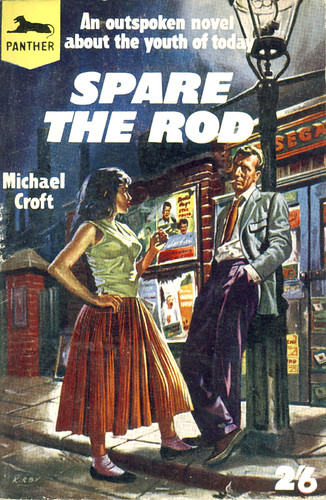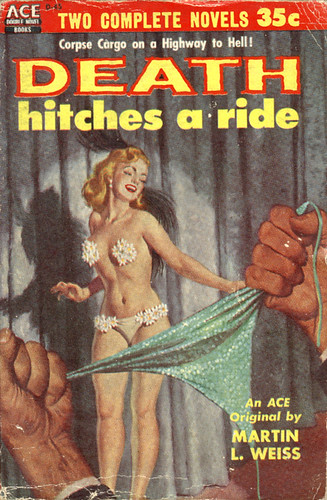I’m reading a biography of Percy Bysshe. An interesting and talented man, but perhaps just a wee bit erratic; he’s just eloped for the second time, abandoning his first wife and their new child in order to run off with a 16-year-old. And her sister. And he’s still only 21.
Tag: books
Flickr set of the week is sleazy reads by trevira. I particularly love the tagline on the second one.

There’s a rumour doing the rounds that the next iPod will be designed for reading as well as music and video. It remains to be seen whether that happens, and indeed whether the iPod is well-suited for reading (as compared, for example, to the more specialised Sony Reader).
Whether or not their time has come, I do think that electronic reading devices are potentially exciting. It’s not a new idea, of course, and none of the previous attempts have succeeded, not least because the competing technology – the book – is so very good at its job. A book is already small, light, very high-resolution, has a simple intuitive user interface and doesn’t need power. For you to spend a few hundred pounds on an electronic version, it’s going to have be pretty damn good. One advantage of building it into a music player is that it gives people a reason to buy it.
So if books are so good anyway, why do I think it’s a good idea? Firstly there’s the capacity. It’s not just one book, it’s a whole library. Even just for reading on a commute you might want to have a choice of three or four books. If you were going away for a few months, you could take hundreds of titles. You could keep reference books on there. Assuming that the system was able to read generic text files, HTML and PDF, you wouldn’t even need to buy all the books from Apple; just think of the enormous wealth of stuff which is out of copyright.Project Gutenberg has 18,000 books available for download.
But the other point is that it doesn’t have to be books. You could plug it in every night and have your computer automatically update it with all your favourite blogs and news services. You might even be willing to pay a modest subscription to get the newspaper(s) of your choice automatically downloaded onto your iPod to read on the train.
During the American War of Independence, the British promised freedom and land to any slaves who left their masters and served with the British. Many thousands did so, and after the war they were taken first to Nova Scotia and then settled in a colony in Sierra Leone. This book tells that story.
Among the slaves who decided that their best hope of freedom was with the British were some who had belonged to George Washington. At times I got the feeling that Schama, as a British historian working in the US, got a degree of mischievous pleasure from writing about the War of Independence from an angle that shows the British as the defenders of liberty and equality in the face of American tyranny.
It’s not that simple of course. The original decision to offer freedom was pragmatic rather than a principled, and in practice the implementation of it was consistently undermined by the greed, paternalism and piety of British administrators. The book does include some genuinely heroic British figures, but there are no shortage of complete shits as well.
It’s an interesting story and a moving book.
Oliver Sacks fans will remember Temple Grandin as the autistic slaughterhouse designer in An Anthropologist on Mars. She has a particular affinity with animals and has used her talent for understanding them to help her design corrals, feedlots and slaughterhouses which are less stressful for the animals.
The subtitle of Animals in Translation is ‘Using the Mysteries of Autism to Decode Animal Behavior’. Grandin uses her insights as an autistic person to help explain how animals behave and in the process explores the nature of autism itself. That means the book is operating at the intersection of a whole range of different subjects — evolution, selective breeding, autism, animal behaviour, slaughterhouse design, stock handling, animal training — which all shed interesting light on each other. I didn’t come out of it thinking “Ah, now my perception of animals has been transformed!” but I did find it was full of interesting insights. For example, she says that it’s difficult to tell how much pain or distress is being suffered by prey animals (cows, sheep, goats); they try to disguise it, since a sickly animal is likely to be a target for a passing wolf. Predator animals, on the other hand, have no such tendency and will, if anything, exaggerate their pain. As you’ll know if you’ve ever stepped on a cat’s paw.
It’s good. One of those books where you keep reading bits out to people. And if you haven’t read any Oliver Sacks you should read those too.
In Praise of Shadows
‘Modern man, in his well-lit house, knows nothing of the beauty of gold…’
From Junichirō Tanizaki’s In Praise of Shadows, an essay from 1933 discussing the importance of lighting in traditional Japanese aesthetics. The gold, the lacquer, Nō theatre, even Japanese make-up are all, he suggests, dependent for their effect on low, indirect lighting; bright light makes them look garish.
He contrasts this with a Western ideal of brightly-lit rooms, but I’m sure the same applies. We have an inherited reverence for gold and diamonds, but do they really look anything special under electric light? When I read Anglo-Saxon poetry, I imagine the gold glowing by fire and lamplight.


